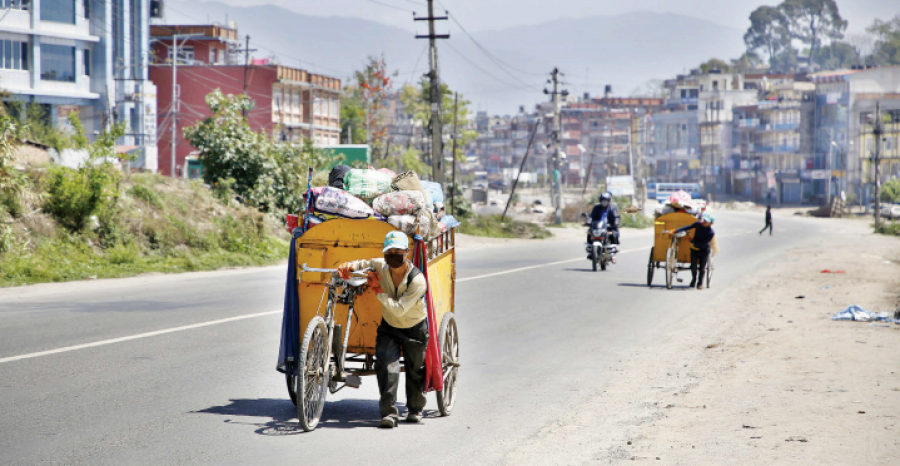National
Garbage collectors who make sure diseases don’t spread are now at risk of contracting Covid-19
Sanitation workers are a high-risk group since they come into contact with objects that could host the coronavirus but they’re working without proper protective gear.
Anup Ojha
While most of Kathmandu has been forced indoors by the lockdown, Babu Pode still leaves home every day at 5:30 am. He goes to Kalimati, then Teku hospital and up to Tripureshwor, collecting garbage.
Pode is one 835 garbage collectors and sweepers employed by the Kathmandu Metropolitan City and as an essential service, they continue to go from road-to-road-alley-to-alley collecting garbage and sweeping the streets. And most of them do so without adequate protection from the coronavirus.
“Everyone is inside, but we have no choice even though we are at very high risk of contracting the coronavirus,” said 42-year-old Pode. “The city has just provided us with a surgical mask and gloves. We don’t feel safe.”
Alongside city employees like Pode, there are around 2,500 privately employed garbage collectors, who are all at heightened risk of contracting Covid-19, say doctors.
“People who pick up garbage are at risk, not from person-to-person but from objects that might have been touched and discarded by infected persons,” said Dr Sher Bahadur Pun, a virologist at the Sukraraj Tropical and Infectious Disease Hospital.
Like Pode, 39-year-old Maya Tamang, also a garbage collector, said that she is afraid of contracting the disease. Although she’s privately employed, all she’s received as protective gear is a pair of surgical gloves and a cloth mask.
“I have been using the cloth mask and the gloves by washing them after use,” said Tamang.
According to Nawaraj Maskey, owner of a private garbage collection company that mobilises 20 garbage collectors every morning, there is a shortage of protective gear in the market and they’ve only been able to provide equipment that might not be effective enough to prevent Covid-19.
“I have talked to city officials but they keep saying they will get the protective equipment soon,” he said. “It's been two weeks and we still don’t have it.”
When Mitra Ghimire, general secretary at the Solid Waste Management Association Nepal, an umbrella organisation of over 70 private garbage collection companies, visited the Health Ministry to ask for supplies, he was told that since even doctors don’t have safety measures right now, they couldn’t expect Personal Protective Equipment for garbage collectors, he said.
But it’s not just protective equipment, garbage collectors are facing numerous difficulties carrying out their jobs. Without public transport, they have to walk to their assigned areas for clean-up and while on their way, they are often harassed and detained by the police, according to city police inspector Purna Chandra Bhatta, who is responsible for mobilising sweepers and garbage collectors. In the first week of the lockdown, he had to get half a dozen detained garbage collectors released, he said.
“It’s hard for the people collecting garbage,” said Bhatta. “If these people are not mobilised, there will be a risk of other diseases.”
According to Kathmandu’s environment division chief Hari Bahadur Shrestha, the city is working to obtain protective gear but he was unsure when exactly these would be distributed to garbage collectors and sweepers.
“We can’t stay at home, as officials call for work calling it an emergency sector. Even my children whose schools are closed due to coronavirus do not want me to go out, but I have to work for them,” said Pode.
Until Saturday, over 1.13 million people had contracted Covid-19, with 60,381 global deaths.




 9.7°C Kathmandu
9.7°C Kathmandu.jpg)














